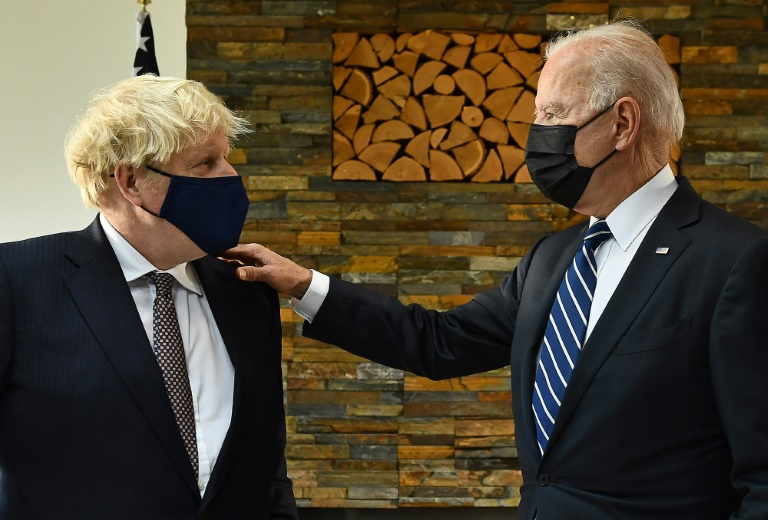British Prime Minister Boris Johnson on Thursday played down reported tensions with US President Joe Biden over the impact of Brexit on the fragile peace in Northern Ireland, after the pair met for their first face-to-face talks on the eve of the G7 summit.
The two leaders were all smiles as they posed for the media before 90 minutes of closed-door discussions, overshadowed by claims Biden had ordered a rebuke to London amid its row with the European Union over new trading arrangements in Northern Ireland.
According to The Times, Washington’s most senior diplomat in London, Yael Lempert, told Brexit Minister David Frost the UK government was “inflaming tensions in Ireland and Europe with its opposition to checks at ports in the province”.
US national security advisor Jake Sullivan insisted the president — a proud Irish-American with distant family still in Ireland — would not make “threats or ultimatums” to Johnson.
But he said Biden was “rock solid” in the belief that the 1998 Good Friday Agreement that ended three decades of violence over British rule in Northern Ireland must be protected.
Adding to the pressure on Johnson, EU leaders said they would also bring up the row when they meet the British leader on Saturday, as member state Ireland said it welcomed US support.
French President Emmanuel Macron warned Johnson, who he is to meet on the sidelines of the G7 meeting, that “it is not serious to want to revisit, in the month of July, what we finalised after years of work on December”.
Before heading to the summit in southwest England, Macron added: “I believe in the power of treaties. I believe in seriousness. Nothing is renegotiable. Everything is applicable.”
Johnson denied however that Biden raised alarm over Northern Ireland and insisted there was “absolutely common ground” on all sides in upholding the landmark peace accord.
“I’m optimistic we can do that,” he told reporters in Carbis Bay, Cornwall.
– Peace process –
The meeting with Biden came at the start of his first foreign tour as US president that takes in NATO, the EU and talks with Russia’s Vladimir Putin, and was billed as a chance for the old allies to help shape the post-pandemic world.
Biden and Johnson agreed a modern version of the 1941 charter signed by their predecessors Winston Churchill and Franklin D. Roosevelt that determined the new world order after World War II.
Biden called the meeting “very productive” and echoed Johnson’s commitment to supporting the peace process in Northern Ireland, without elaborating.
“We affirmed the special relationship — it’s not said lightly — the special relationship between our people,” he added.
New trading arrangements for Northern Ireland introduced in January after the UK left the European single market and customs union, nearly four years after the divisive Brexit vote, have caused tensions with the EU — and alarm in Washington.
Under a new protocol, checks are supposed to be carried out on deliveries heading into Northern Ireland from mainland Britain, to prevent unchecked goods going into the single market via neighbouring EU member Ireland.
But pro-British unionist communities say the new rules have driven a wedge between the province and the rest of the UK, increasing the likelihood of reunification with Ireland.
London suspended checks earlier this year because of threats to port staff, and the protocol has been blamed for the worst violence in years in the British-run province.
Talks to resolve the simmering feud broke up in London without agreement Wednesday, with Europe threatening retaliatory action, including tariffs, if the new trading arrangements are not implemented.
– Vaccine diplomacy? –
Biden on Wednesday night outlined the need for global collaboration to rebuild after Covid-19 and reset diplomatic ties after the isolationism of the Trump era, declaring: “The United States is back!”
On Thursday, he confirmed US plans to donate 500 million Covid vaccine doses for 92 poorer countries as a “historic step” to boost the collective fight-back against the global pandemic.
“This is about our responsibility, our humanitarian obligation, to save as many lives as we can,” he said.
Other G7 countries — hosts Britain, Canada, France, Germany, Italy and Japan — will follow suit, and outline a way to ending the pandemic, he added.
But as Russia and China also engage in so-called “vaccine diplomacy” and campaigners press for a level playing field on global vaccine distribution, a senior US official denied the US was seeking any quid pro quo.
“This is the right thing to do, it’s the smart thing to do, and it is tangible proof that it is going to be the world’s democracies who ultimately deliver when it comes to beating the Covid-19 pandemic,” he said.
In Paris, Macron called on pharma groups producing vaccines against Covid-19 to donate 10 percent of their production to poor nations.
He also urged fellow G7 leaders to back a goal of getting 60 percent of Africans vaccinated by the end of March next year — a figure more ambitious than the international Covax jab scheme — as the WHO warned of a huge shortfall in doses.
burs-phz/wai/har










